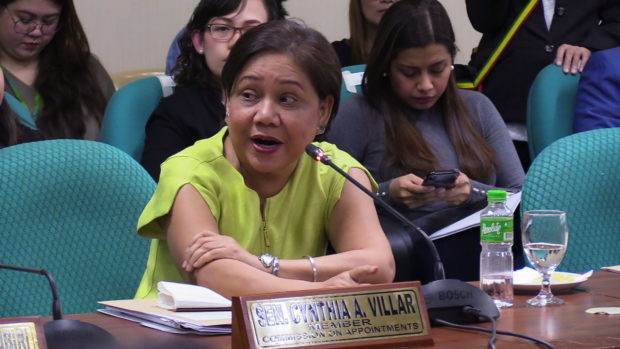
Sen. Cynthia Villar. INQUIRER.net file photo / CATHY MIRANDA
Senator Cynthia Villar lamented the “misconceptions” being circulated to discredit the rice tarrification bill, which the Senate passed on final reading last week and is set to be discussed by the bicameral conference committee on Thursday (Nov. 22).
“It is unfortunate that some groups are being made to believe that the rice tariffication bill, which we have scrutinized and carefully studied in the Senate, will not be beneficial to farmers,” Villar said in a statement.
Contrary to misconceptions, she said the bill includes a package of support programs that “will help farmers adjust to competition under a tariffied regime,” Villar chairs the Senate Committee on Agriculture and Food and authored the Senate Bill 1998 or the Senate’s version of the bill.
READ: Senate approves rice tariffication bill on final reading
READ: House OKs revised agricultural tariffication bill on final reading
The rice tariffication bill aims to replace import restrictions on rice with tariffs, lifting the quantitative restrictions on rice imports and creating the Rice Competitiveness Enhancement Fund or Rice Fund. President Rodrigo Duterte earlier certified the bill as urgent.
READ: Duterte certifies rice tariffication bill as urgent
“It is not true that the bill will allow the use of the Rice Fund to be politicized because the bill is very specific as to where the P10 billion fund and the excess rice tariff revenues will be spent,” Villar said.
According to Villar, the bill will also help remove the barriers to competitiveness of Filipino farmers, including lack of mechanization, technical know-how, financial literacy, and access to cheap credit.
She added that the excess rice tariff revenues and the P10 billion fixed appropriation for the Rice Fund will be released to the Department of Agriculture and will be used for providing direct financial assistance to rice farmers.
READ: DA: Rice tariff to help farmers
This will serve as compensation for the project reduction or loss of farm income arising from the tarrification, she said.
Rice Fund
Under the bill, 50 percent of the Rice Fund will go to the Philippine Center for Post-Harvest Development and Modernization (PhilMech) to provide farmers with machineries and equipment.
Thirty percent will be allocated to the Philippine Rice Research Institute (PhilRice), which will be used for the development, propagation, and promotion of inbred rice seeds to rice farmers and organization of rice farmers into seed growers associations engaged in seed production and trade.
Ten percent, meanwhile, will be made available in the form of credit facility with minimal interest rates and with minimum collateral requirements to rice farmers and cooperatives.
Another 10 percent will fund extension services by PhilMech, Agricultural Training Institute, and the Technical Education and Skills Development Authority (Tesda) for programs for teaching skills on rice crop production, modern rice farming techniques, and seed production, among others.
Villar said the Senate version of the bill also has a portion of the excess rice tariff revenues for the titling of agricultural lands, expanded crop insurance program on rice, and the crop diversification program.
She said the bill, if enacted into law, will likewise provide a more focused function for the National Food Authority to buy palay from local farmers. /jpv